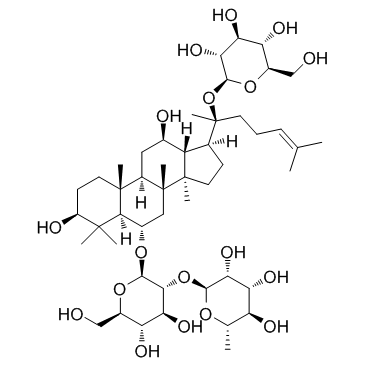Effects of ginsenoside Re on LPS-induced inflammatory mediators in BV2 microglial cells.
Kang-Woo Lee, So Young Jung, Sun-Mi Choi, Eun Jin Yang
文献索引:BMC Complement Altern. Med. 12 , 196, (2012)
全文:HTML全文
摘要
Microglial activation plays an important role in neurodegenerative diseases by producing several pro-inflammatory enzymes and pro-inflammatory cytokines. Lipopolysaccharide (LPS)-induced inflammation leads to the activation of microglial cells in the central nervous system (CNS) and is associated with the pathological mechanisms of neurodegenerative diseases, including PD, AD, and ALS. Ginseng is a natural antioxidant used in herbal medicine and contains ginsenosides (Rb1, Rg1, Rg3, Re, and Rd), which have anti-neoplastic and anti-stress properties.This study demonstrates the involvement of the anti-inflammatory signaling pathway, ginsenoside-Re (G-Re), which is one of the ginsenosides mediated by LPS-induced neuroinflammation in BV2 microglial cells.BV2 microglial cells were pretreated with 2 μg/ml G-Re and stimulated with 1 μg/ml LPS to induce neuroinflammation. To investigate the effect of G-Re on LPS-induced cell signaling, we performed western blotting and immunofluorescence using specific antibodies, such as phospho-p38, COX2, and iNOS.Pretreatment with 2 μg/ml G-Re was neuroprotective against 1 μg/ml LPS-treated microglial cells. The neuroprotective events induced by G-Re treatment in neuroinflammation occurred via the phospho-p38, iNOS, and COX2 signaling pathways in BV2 cells.Taken together, we suggest that G-Re exerts a beneficial effect on neuroinflammatory events in neurodegenerative diseases.
相关化合物
| 结构式 | 名称/CAS号 | 分子式 | 全部文献 |
|---|---|---|---|
 |
人参皂苷Re
CAS:52286-59-6 |
C48H82O18 |
|
Development of a secondary antibody thio-functionalized micr...
2012-05-15 [Anal. Chem. 84(10) , 4327-33, (2012)] |
|
Chronic toxicity of ginsenoside Re on Sprague-Dawley rats.
2012-12-18 [J. Ethnopharmacol. 144(3) , 656-63, (2012)] |
|
Antibiotics attenuate anti-scratching behavioral effect of g...
2012-06-26 [J. Ethnopharmacol. 142(1) , 105-112, (2012)] |
|
Effect of ginsenoside Re on depression- and anxiety-like beh...
2012-05-01 [J. Microbiol. Biotechnol. 22(5) , 708-20, (2012)] |
|
Mucilaginibacter composti sp. nov., with ginsenoside convert...
2011-06-01 [J. Microbiol. 49(3) , 393-8, (2011)] |